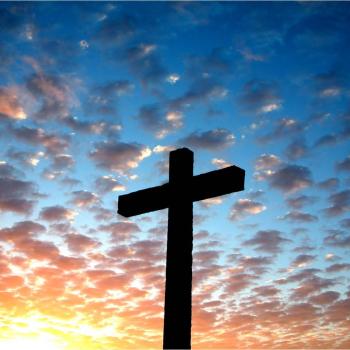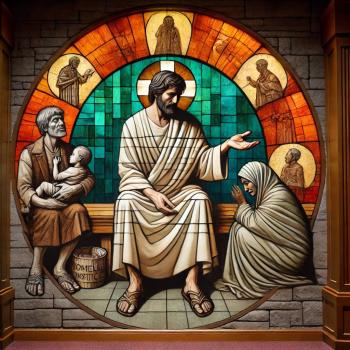(These are my notes for my sermon, Jan. 24)
When we think about the story of Jonah, We think about Jonah and the whale. That’s not the important part of Jonah. That’s not what the story is about.
I’m going to try to read it quickly, but I want to tell the whole story of Jonah. Notice how little attention is actually paid to the whale.
There are several points that need to be made, so let’s look at Jonah…
The Lord said to Jonah: 2 “Go to the great city of Nineveh and preach against it, because its wickedness has come up before me.”
3 But Jonah ran away from the Lord and headed for Tarshish. He went down to Joppa, where he found a ship. After paying the fare, he sailed for Tarshish to flee from the Lord.
Why would Jonah run away? Why doesn’t he want to go to Nineveh?
First, it could be, he hates public speaking, and doesn’t want to go preach.
Second, Nineveh was the largest city in the world. It was larger than Babylon – according to one ancient source, Babylon was 385 furlongs, but Nineveh was 480. It was located in what is now modern Iraq.
Third, the Ninevites were the enemies of the Israelites. So, he might like for the people of Nineveh to be wiped out. He might be thinking, “Nineveh, what good has ever come out of there?”
But, instead of doing what God commands, he takes off on a boat for Tarshish.
What is Tarshish? The place you’d rather be. The greener grass in the other yard. Tarshish is the place you go when you’re not doing God’s will. Tarshish is what you do when you’re not doing what God has called you to do.
A Storm arises while Jonah is asleep, and the sailors freak out. They blame Jonah for the storm.
When they demand to know who he is, and where he’s from, he says, “I am a Hebrew and I worship the Lord, the God of heaven, who made the sea and the dry land.”
11 The sea was getting rougher and rougher. So they asked him, “What should we do to you to make the sea calm down for us?”
12 “Pick me up and throw me into the sea,” he replied, “and it will become calm. I know that it is my fault that this great storm has come upon you.”
… Let me pause here. Why does he suggest they pick him up and throw him in the sea? Perhaps because he felt guilty that the Lord sent a storm that put these innocent sailors in danger. In fact, I looked on line, and I couldn’t find a good reason why Jonah would tell them to throw him in the water. I have no idea. Anyone have any ideas they’re willing to share?
But, they didn’t kill him, as Jonah suggested.
13 Instead, the men did their best to row back to land. But they could not, for the sea grew even wilder than before. 14 They cried out to the Lord, “Please, Lord, do not let us die for taking this man’s life. Do not hold us accountable for killing an innocent man, for you, Lord, have done as you pleased.”
I feel sorry for these tempest tossed sailors. They are stuck between a horrible storm, and throwing a man overboard, because he told them to.
15 Then they took Jonah and threw him overboard, and the raging sea grew calm. 16 At this the men greatly feared the Lord, and they offered a sacrifice to the Lord and made vows to him.
This reminds me of the story of John Newton, the author of the song Amazing Grace… (Explain Story) … That day at the helm, March 21, 1748, was a day that changed Newton forever. He later wrote, “On that day the Lord sent from on high and delivered me out of deep waters.” He also said, “Only God’s amazing grace could take this rude and profane slave-trading sailor and change him into a child of God.”
17 Now the Lord provided a huge fish to swallow Jonah, and Jonah was in the belly of the fish three days and three nights.
We’re going to skip the prayer of Jonah…
10 And the Lord commanded the fish, and it vomited Jonah onto dry land.
And that’s it for the story of the whale… a huge fish. Two sentences. The story of Jonah is not about the whale.
So, what is the story of Jonah about?
Let’s keep reading.
Chapter 3 – Then the word of the Lord came to Jonah a second time: 2 “Go to the great city of Nineveh and proclaim to it the message I give you.”
3 Jonah obeyed the word of the Lord and went to Nineveh. Now Nineveh was a very large city; it took three days to go through it. 4 Jonah began by going a day’s journey into the city, proclaiming, “Forty more days and Nineveh will be overthrown.” 5 The Ninevites believed God. A fast was proclaimed, and all of them, from the greatest to the least, put on sackcloth.
Even the king took off his royal robes, and repented. The king issued a decree proclaiming a fast for all people and animals, and urged everyone to call on God.
In verse 10, God changes his mind.
10 When God saw what they did and how they turned from their evil ways, he relented and did not bring on them the destruction he had threatened.
God changed God’s mind.
Another example of God relenting, and changing God’s mind is in Genesis, when God is determined to destroy Sodom. Abraham asks would the Lord spare the city if Abraham can find 50 righteous men. Tell the story – He answered, “For the sake of ten, I will not destroy it.”
This opens the door to deep theological consideration.
If God changes God’s mind, what does that mean?
It means that no matter what we do, no matter how bad we are, God has already forgiven us.
Just like God forgiving the people of Nineveh, God forgives our sins and transgressions when we repent and turn from our evil ways.
Chapter 4 – But to Jonah this seemed very wrong, and he became angry. 2 He prayed to the Lord, “Isn’t this what I said, Lord, when I was still at home? That is what I tried to forestall by fleeing to Tarshish. I knew that you are a gracious and compassionate God, slow to anger and abounding in love, a God who relents from sending calamity. 3 Now, Lord, take away my life, for it is better for me to die than to live.”
Jonah is disappointed and angry with the Lord, because the Lord spares the people of Nineveh.
In Jonah’s own words, the Lord is gracious and compassionate. The Lord is slow to anger and abounding in love. The Lord relents from sending calamity.
There are several possible reasons for Jonah’s desire to see Nineveh destroyed. First, Nineveh was the capital city of Assyria, and these people were enemies of Israel. Nineveh’s destruction would have been seen as a victory for Israel.
Second, God changing God’s mind about the destruction of Nineveh could have made Jonah’s words appear illegitimate, since he had predicted the city’s destruction. It made him look bad.
In his anger, Jonah goes and sits outside the city, and the Lord provides a plant to shade Jonah. The next day, the plant died, and Jonah got angry again, about the loss of the plant.
Verse 9 – But God said to Jonah, “Is it right for you to be angry about the plant?”
“It is,” he said. “And I’m so angry I wish I were dead.”
10 But the Lord said, “You have been concerned about this plant, though you did not tend it or make it grow. It sprang up overnight and died overnight. 11 And should I not have concern for the great city of Nineveh, in which there are more than a hundred and twenty thousand people who cannot tell their right hand from their left—and also many animals?”
Jonah is stubborn, unmerciful, and unloving. He was angry after God didn’t destroy Nineveh. Yet when God took the plant from him he becomes just as angry. He cares more for the plant than for his fellow humanity in Nineveh.
We can learn from Jonah’s negative example that we should praise God for His goodness. Our God is a merciful God, ready to forgive all those who repent. The Ninevites were Gentiles, yet God still extended His salvation to them. In His goodness, God warned the Assyrians before sending judgment, giving them a chance to repent.
The primary theme in Jonah is that God’s compassion is boundless, not limited just to “us” but also available for “them.” Even Jonah is the object of God’s compassion.
The story of Jonah is about God’s forgiveness. God’s forgiveness is for everyone. For the enemy, for the stranger, for sailors, for everyone. We are made in the image of God, so God forgives who God forgives, and neither we nor Jonah can do anything to stop it.
Nothing on heaven or earth can keep us from God’s love.
God love us, just as God loved the Ninevites. Just as the Lord loved Jonah.
God’s amazing grace takes the most hardened heart and turns it into a child of God.
This is God’s promise, let us sing God’s praises.
****************************************************************
Jim Meisner, Jr. is the author of Soar to Success the Wright Way, a motivational history book about the Wright brothers and the novel Faith, Hope, and Baseball.
Follow this link for more information about both books: https://faithonthefringe.com/faith-hope-and-baseball-a-novel/













